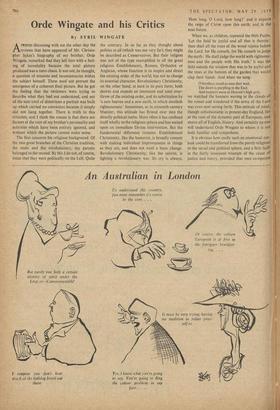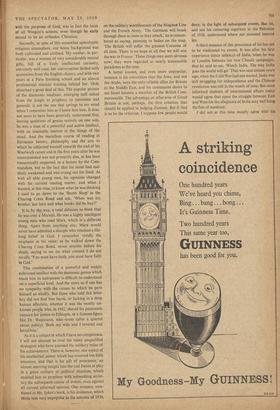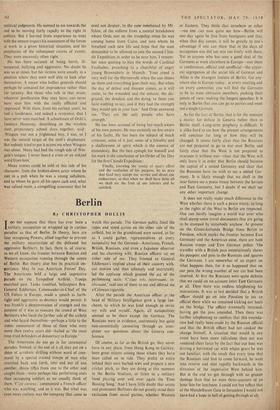Orde Wingate and his Critics
By SYBIL WING ATE
ArRIEND discussing with me the other day the reviews that have appeared of Mr. Christo- pher Sykes's biography of my brother; Orde Wingate, remarked that they left him with a feel- ing of incredulity because the total picture produced was a mere chaos. It was not, he thought, a question of tensions and inconsistencies within the subject himself. These need not prevent the emergence of a coherent final picture. But he got the feeling that the reviewers were trying to bescribe what they had not understood, and out of the sum total of distortions a portrait was built up which carried no conviction because it simply did not hang together. There is truth in this criticism, and I think the reason is that there are factors at the root of my brother's personality and activities which have been entirely ignored, and without which the picture cannot make sense.
The first concerns his religious background. Of the two great branches of the Christian tradition, the static and the revolutionary, my parents belonged to the second. By this I do not, of course, mean that they were politically on the Left. Quite the contrary. In so far as they thought about politics at all (which was not very far), they might be described as Conservatives. But their religion was not of the type exemplified in all the great religious Establishments, Roman, Orthodox or Anglican, whose function is to inspire and direct the existing order of the world, but not to change its essential character. Revolutionary Christianity, on the other hand, at least in its pure form, both desires and expects an imminent and total over- throw of the existing order, and its substitution by 'a new heaven and a new earth, in which dwelleth righteousness.' Sometimes, as in sixteenth-century Munster, this attitude has flowed over into the directly political realm. More often it has confined itself wholly to the religious sphere and has waited upon an immediate Divine intervention. But the fundamental difference remains. Establishment Christianity, like the humorist, is broadly content with making individual improvements in things as they are, and does not want a basic change. Revolutionary Christianity, like the satirist, is fighting a revolutionary war. Its cry is always, 'How long, 0 Lord, how long?' and it expects the reign of Christ upon this earth, and in the near future.
When we, as children, repeated the 96th Psalm, let the field be joyful and all that is therein : then shall all the trees of the wood rejoice before the Lord, for He cometh, for He cometh to judge the earth : He shall judge the world with righteous- ness and the people with His truth,' it was the field outside the window that was to be joyful and the trees at the bottom of the garden that would clap their hands And when we sang:
0 brothers stand as men that wait, The dawn is purpling in the East, And banners wave at Heaven's high gate,
we watched the banners waving in the clouds of the sunset and wondered lithe army of the Lord was even now setting forth. This attitude of mind, though unfashionable in present-day England, lies at the root of the dynamic part of European, and above all of English, history. And certainly no one will understand Orde Wingate to whom it is not both familiar and sympathetic.
It is obvious how easily such an emotional out- look could be transferred from the purely religious to the social and political sphere, and a firm faith in the fairly imminent triumph of the cause of justice and mercy, provided that men co-operate with the purposes of God, was in fact the basis of all Wingate's actions, even though he early ceased to be an orthodox Christian.
Secondly, in spite of this somewhat apocalyptic religious atmosphere, our home background was both cultivated and civilised. My mother, in par- ticular, was a woman of very considerable mental gifts, full of a lively intellectual curiosity, extremely well read, her conversation larded with quotations front the English classics, and with two years at a Paris finishing school and an almost professional musical training behind her. Orde absorbed a great deal of this. The popular picture of the daemonic madman, emerging half naked from the jungle to prophesy to statesmen and generals, is not the one that springs to my mind when I remember him as I knew him best. It does not seem to have been generally understood that, leaving questions of genius entirely on one side, he was a man of a powerful and active intellect, with an insatiable interest in the things of the mind. And the marathon course of reading in European history, philosophy and the arts to which he subjected himself towards the end of his Woolwich career and in the first years after he was commissioned was not primarily due, as has been romantically supposed, to a lecture by the Com- mandant, but to the fact that his mind had sud- denly awakened and was crying out for food. As with all able young men, his opinions changed with his current reading matter, and when I wanted, at this time, to know what he was thinking I used to go down to the 'Bomb Shop' in the Charing Cross Road and ask, 'When was my brother last here and what books did he buy?'
It is, by the way, a total delusion to think that he was ever a Marxisi. He was a highly intelligent young man who read Marx, which is a different thing. Apart from anything else, Marx would never have admitted a disciple who retained a life- long belief in God. I remember vividly the emphasis in his voice, as he walked down the Charing Cross Road, seven months before his death, saying to me (in what context I do not recall), 'You must have faith, you must have faith in God.'
This combination of a powerful and widely cultivated intellect with the daemonic genius which made him its instrument is difficult to understand on a superficial level. And the more so if one has no sympathy with the causes to which he gave himself so wholly. But those who held this latter key did not find him harsh, or lacking in a deep human affection, whether it was the mostly un- known people who, in 1942, shared his passionate concern for justice to Ethiopia, or a famous figure like Dr. Weizmann, who wrote (after a quarrel about policy), 'Both my wife and I revered and loved him.'
As it is a subject in which I have no competence, I will not attempt to rival the many unqualified strategists who have assessed the military value of his achievements. There is, however, one aspect of his intellectual power which has received too little attention, and that is his gift of prescience, an almost unerring insight into the real forces at play in a given military or political situation, which enabled him to prophesy with astonishing accur- acy the subsequent course of events, even against all current informed opinion. One instance, men- tioned in Mr. Sykes's book, is his insistence, which made him very unpopular in the autumn of 1939, on the military worthlessness of the Maginot Line and the French Army. 'The Germans will break through them as soon as they attack,' he is remem- bered as saying, pointing to Sedan on the map. 'The British will suffer the greatest Corunna of all time. There is no hope at all that we will win the war in France.' These things may seem obvious now; they were regarded as nearly treasonable paradoxes at the time.
A better known, and even more unpopular, instance is his conviction that the Jews, and not the Arabs, were the only reliable allies for Britain in the Middle East, and his consequent desire to see Israel become a member of the British Com- monwealth. The advantage or otherwise of Great Britain is not, perhaps, the first criterion that should be applied in judging Zionism. But if that is to be the criterion, I suppose few people would deny, in the light of subsequent events, that he, and not his censuring superiors in the Palestine of 1938, understood where our national interest lay.
A third instance of this prescience of his has yet to be vindicated by events. It was after his first experience (since infancy) of India, when he was in London between his two Chindit campaigns, that he said to me, 'Watch India. The way India goes the world will go.' That was said sixteen years ago, when the Cold War had not started, India was still struggling for independence and the Chinese revolution was still in the womb of time. But most informed students of international affairs today would agree that upon the struggle between East and West for the allegiance of India may well hang the fate of mankind.
I did not at this time usually agree with his
politicaI judgments. He seemed tome towards the end to be moving fairly rapidly to the right in politics. But I learned from experience to treat with the utmost respect his assessment of the forces at work in a given historical situation, and his prophecies of the subsequent course of events. They were uncannily often right.
He has been accused of being harsh, ill- tempered, bullying and aggressive. No doubt he was so at times, but his victims were usually in a position where they were well able to look after themselves. A major who bullies generals should perhaps be censured for imprudence rather than for tyranny. But those who talk in that strain, whatever justification they may have, can never have seen him with the really afflicted and oppressed. With them, from his earliest years, he had a tenderness, and indeed a reverence, that I have never seen matched. A schoolmate of Orde's, fossleyn . Hennessy, describing on the wireless their preparatory school days together, said :
• Wingate was not a frightened boy, I was, so I was the natural target of the mob's displeasure. But nobody tried to put it across me when Wingate was about. Many had had the rough side of Win- gate's tongue: I never heard a cross or an unkind word from him.'
Many stories could be told of this side of his character, from the broken-down actor whom he met in a pub when he was a young subaltern, and to whom he gave all his spare cash and, what was valued more, a compelling assurance that he
need not despair, to the .case mentioned by Mr. Sykes, of the sufferer from a mental breakdown whom Orde met on the troopship when he was coming home from Cairo, and into whom he breathed such new life and hope that the man demanded to be allowed to join the second Chin- dit Expedition in order to be near him. I remem- ber once quoting to him the words of Cardinal Faulhaber, preaching to a churchful of angry young Brownshirts in Munich: 'Your creed is very well for the Herrenvolk when the sun shines on them and everything goes their way. But when the day of defeat and disaster comes, as it will come, to the wounded and the outcast, the dis- graced, the desolate and the dying, to them you have nothing to say, and if they had the strength they would spit in your face.' And Orde answered me. 'They are the only people who have strength.'
He has been accused of being too much aware of his own powers. He was certainly no less aware of his faults. He has been the subject of much criticism, some of it just, some of a frivolity and a shallowness of spirit which is the essence of immodesty. But the best epitaph for himself and his work is the conclusion of his Order of the Day for the first Chindit Expedition : Finally, knowing the vanity of man's effort
and the confusion of his purpose, let us pray that God may accept our service and direct ,our endeavours, so that when we shall have done all we shall sec the fruit of our labours and be satisfied.
















































 Previous page
Previous page